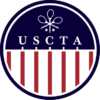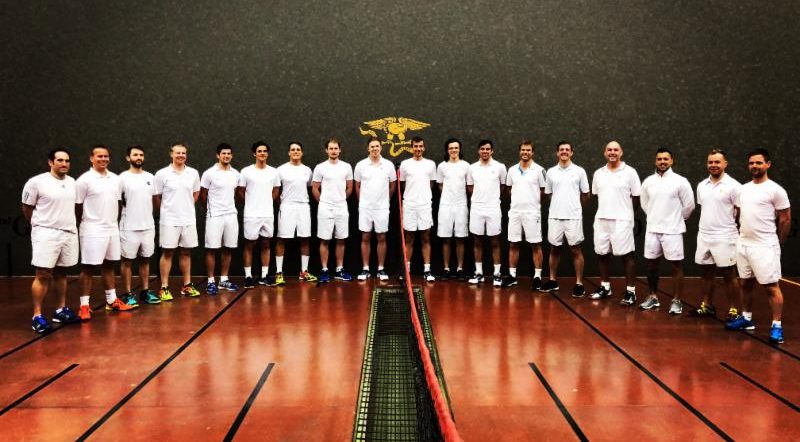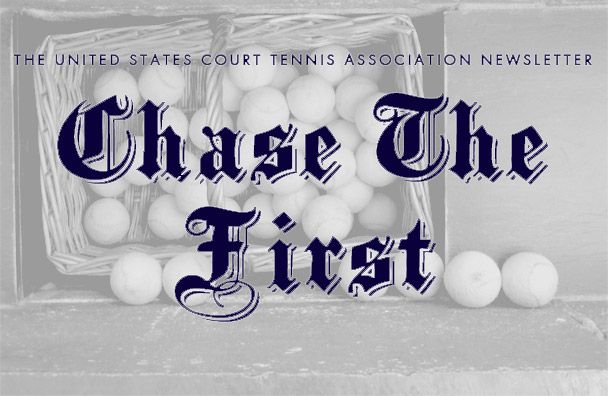Cam is A ’Comin’
By James Zug
The past eight days have put an emphatic stamp on the world of tennis: Camden Scott Riviere is back. The ginger-haired southpaw from Aiken won the 61st United States Open on the Van Alen Court at the Racquet Club of Philadelphia. He captured his second Open title without the loss of a set, conceding just seven games in his first three matches and overall a total of fourteen games in twelve sets. In the semis, he demolished the defending champion Bryn Sayers 0, 2 and 1 and in the finals he dismissed his long-time rival Steve Virgona 2, 4 and 1.
Seeded three, Riviere was hoping to complete his comeback from injury and, as he said after his victory, “remind everyone that I was still here.” Riviere, who will turn twenty-six in May, is now in the prime of his career and will regain the #2 slot in the world rankings.
He was here once before. A half dozen years ago he was the young prodigy. He turned pro at seventeen in 2005 and challenged Rob Fahey for the World Championship in 2008 at Fontainebleau.
After the meteoric rise, he was felled by injury. He broke his right wrist in a tumble at the European Open at Lords in 2010; then tore the labrum in his left shoulder; then ripped a tendon in his left wrist during the 2010 Eliminator Finals at Tuxedo. The right wrist healed and he did extensive therapy on the shoulder—it still bothers him, especially on swings above his head, but it is manageable—yet the left wrist injury was the key problem. He put his forearm in a cast for six months, which allowed his forearm muscles to heal the tendonitis.
In May 2012, now based back in South Carolina, he picked up a racquet for the first time nearly a year. He trained for three weeks. His wrist was too weak to string with regular court tennis string, so he used lawn tennis strings. But he surprised everyone, including himself, by knocking off Sayers and Virgona to win the 2012 U.S. Professionals. Since then, he’s been on a tear. In six months he snagged the French Open, the European Open, the IRTPA Championships and the National Open. The only blip was losing in the semis of the British Open in three close sets to Fahey.
The hiatus has matured Riviere. He has relaunched his college education, taking business management and accounting courses online at Strayer University. He has a beard and a new calmness about himself. He is less apt to succumb to emotions. “I was unhappy too often years ago,” he said. “I’d get frustrated. Now I have figured out how I play and I have a game plan and stick to it.”
His plan is partially still about retrieval—he manages to lightning bug around the court with incredible quickness—but also about mixing pace, a shorter groundstroke and hitting to length rather than overhitting.
Right out of the gate against Virgona, Riviere was on fire. He snatched the first seven points and after Virgona righted the ship at 2-2, Riviere seized the next four. Virgona regrouped and took the first three games of the third set. The third game lasted almost as long as the first set. It had six deuces and some fantastic shotmaking. Virgona, willed on by the home-court crowd (he was a pro at RCOP for half a dozen years until last summer when he moved to Chicago), secured the game but in the process Riviere had seemingly gained confidence. Virgona notched just two more games in the match.
One hiccup in the final was a forty-minute delay with Virgona up 4-3 in the second set. The court was quite chilly during the recent cold snap—temperatures in the dedans didn’t reach the upper fifties—and then on the day of the finals Philadelphia saw near-record highs as the temperature soared into the mid-sixties and it became very humid. This caused the walls to sweat and moisture to accumulate on the floor.
A delay because of a wet floor was not new to Riviere. In June 2007 he was playing in his first U.S. Professionals final, against Fahey, when the same thing happened in Newport and there was a three-hour delay. He lost that match but here he knew how to handle the delay and came back on court more precise than before. The humid air and slower balls didn’t favor Virgona, who earlier in the week had simply been overpowering opponents with his blistering forces, and he had no answers for Riviere.
It was a wonderful week on South Sixteenth Street. Gabe Kinzler, a pro at RCOP, overcame Rich Smith from Newport in an exciting four-setter and then put up a good fight against Virgona in the quarters. Kieran Booth came over from Melbourne for his fourth Open and again won the honors for the best result by an amateur, reaching the quarters. Bill Barker, a DC-based amateur, put the scare into Tony Hollins, a pro in Boston, going up 2-1 before losing in five. Tim Chisholm, Tuxedo’s pro, twice won four-set matches before losing to Virgona in the semis. And young John Lumley, just twenty and playing in his first Open, did well; he and Booth reached the semis of the doubles. More is expected of him, considering both his bloodlines and his obvious ability.
In the U.S. Open doubles, the one exciting match before the finals was home pros Rob Whitehouse & Kinzler pushing Ben Matthews & Chris Chapman to five sets in the quarterfinals. In the finals, Riviere & Chisholm proved too formidable. They have developed a good relationship over the years—they were both in Boston five years ago and won the 2006 Open doubles—and are even playing in the U.S. platform tennis (paddle tennis) nationals next month in New Jersey. They never seemed ruffled in their 6-2, 6-5, 6-4 victory of Virgona & Sayers. The match did seem to hang in the balance at 5-5, 30-30 in the second set. But Virgona, guarding the galleries missed a rocket off the bandeau and then Riviere secured a chase of better than a yard; when they switched sides, Chisholm slapped a volley under the grille for a winner.
This will probably be the last Open held at RCOP for a couple of years and it went off beautifully. The crowds were thick and appreciative (if a bit chilly) and at times riven with history: at the singles finals, Jimbo Van Alen was in the dedans, as were Sam Howe and Ed Noll, former Open doubles winners. The cocktail parties and dinners were fun and well-attended. Peter Vogt, the chair of the RCOP tennis committee, and Whitehouse ran an efficient machine. Jon Crowell managed the live streaming online, which got more than two thousand views in total. More than sixty people donated to the purse. Pam Post ran the billeting operations and besides Pam herself, the following hosted players: Bruce Katz, Abbie Kinzler, Norris Jordan, Matt Hyde, Chris Hoffman, Vin Maiello, Dick Tanfield, Steve Sader and Marica Angelides.
So a twin titlist, United States Open champion in singles and doubles, and an interesting fourteen months ahead for Camden Riviere and indeed for the other top players as eyes begin to narrow onto the 2014 challenge for the world championship.


